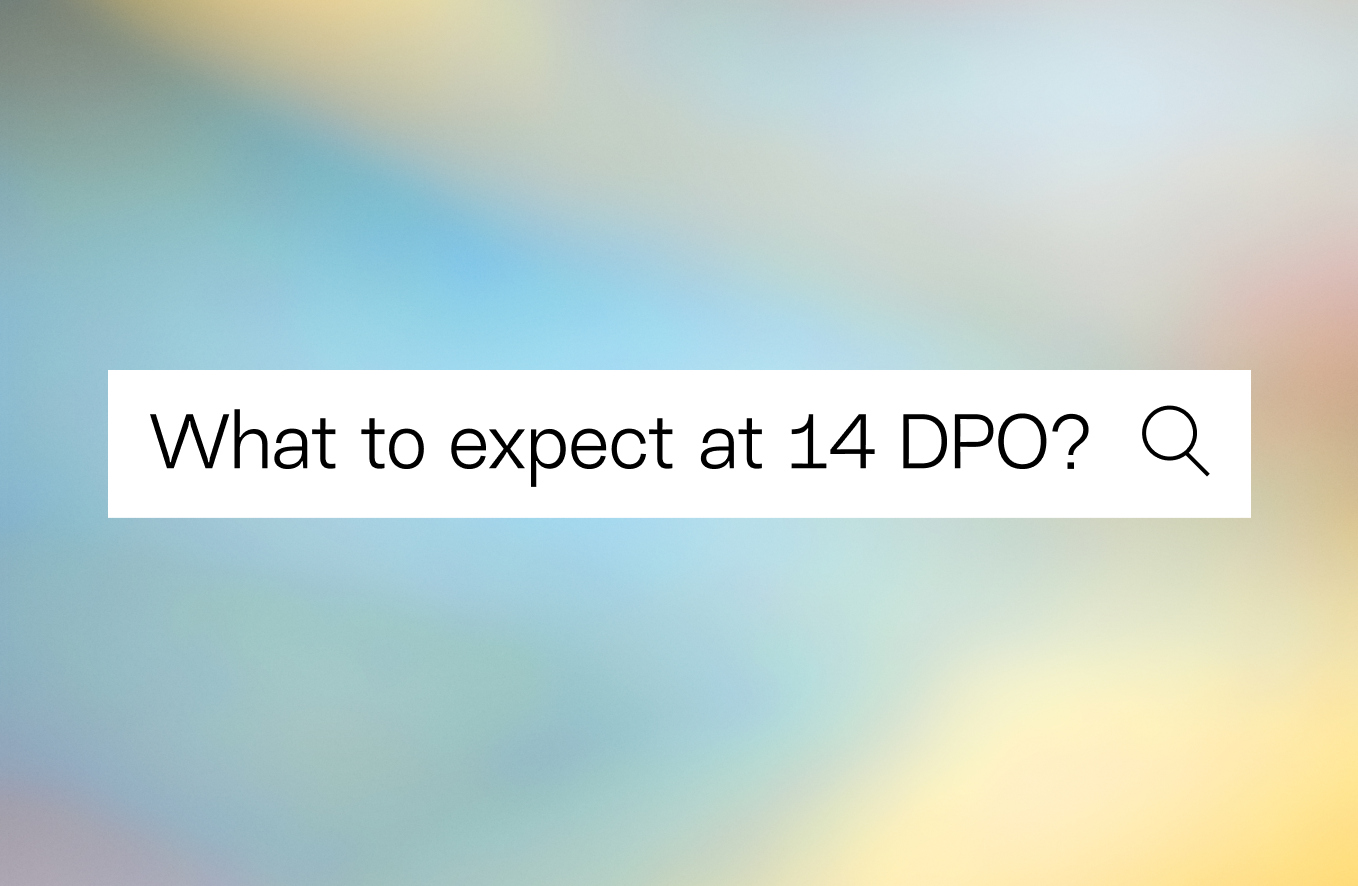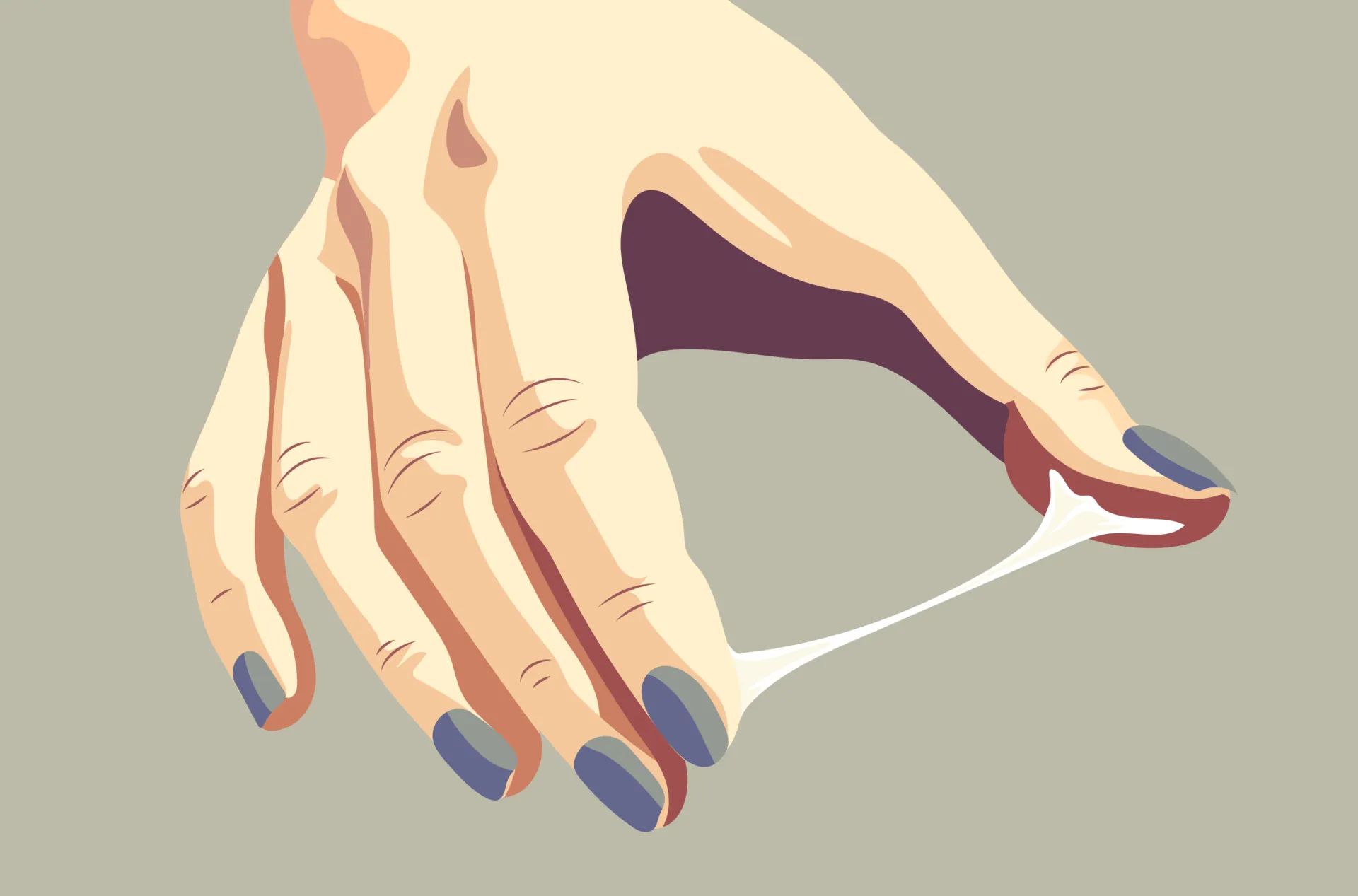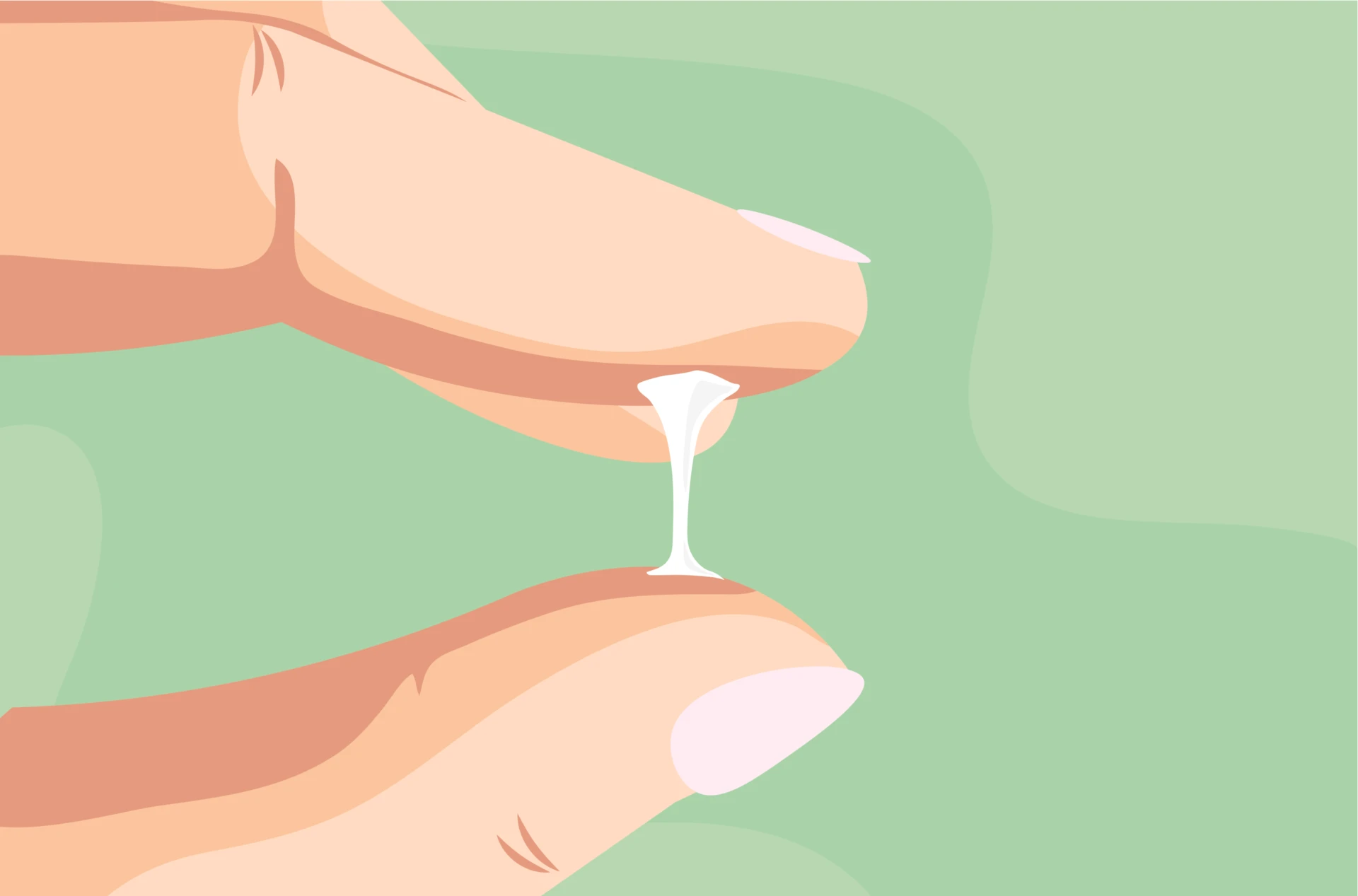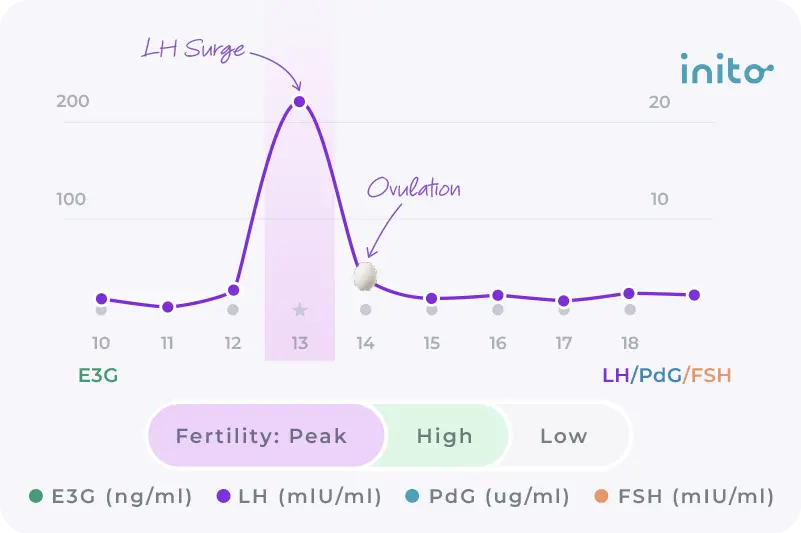Content table
If you’re trying to conceive and have made it to 14 DPO, congrats! You’re almost past the two-week wait –14 nail-biting days that can feel like an eternity.
And if you’re someone with a regular menstrual cycle, then tomorrow’s the big day.
Will your period make an appearance? Or is a baby on the way?
By now, you might feel some 14 DPO symptoms – or feel nothing at all.
You might also wonder whether you can trust a pregnancy test yet, or if you should hold off a few more days.
Well, if you’re tired of playing the waiting game, then I have good news. At 14 DPO, you should have some answers very soon.
In the meantime, knowing what to expect may soothe your nerves and calm some fears. So let’s explore the early pregnancy symptoms to watch for at 14 DPO.
Takeaways
- 14 DPO stands for 14 days past ovulation and marks the end of your luteal phase.
- At 14 DPO, most home pregnancy tests will offer an accurate result.
- While hCG levels range at 14 DPO, one study found the median level was 137 mIU/mL.
- Hormonal changes may lead to 14 DPO symptoms such as nausea, fatigue, cramping, spotting, breast tenderness, and more.
- Some pregnant women may not have any symptoms at all by 14 DPO.
- If you get a negative test result at 14 DPO, you could still be pregnant. Wait a few days and then retest
What happens at 14 days past ovulation?

14 days past ovulation means you ovulated 14 days ago and are now in your luteal phase. Your luteal phase starts the day after ovulation and ends the day before your period begins.
During this time, an egg makes its way down your fallopian tube. The uterus lining also thickens, gearing up for a possible pregnancy.
If a sperm fertilizes the egg, by 14 DPO, the fertilized egg may have implanted into your uterine lining. This triggers hormonal changes that can cause early pregnancy symptoms.
Cramping, spotting, fatigue, or nausea are all things you might notice. We’ll delve deeper into symptoms of 14 DPO in a later section, so stay tuned.
At how many DPO does your period start?
Ovulation typically happens 12-14 days before your cycle. So, if you’re at 14 DPO, your period may arrive tomorrow.
But it’s not always that simple. Menstrual cycles can vary anywhere between 21 to 35 days. And many women have irregular cycles. This makes it tricky to always pinpoint when your period will arrive.
How accurate are pregnancy tests at 14 DPO?
At 14 DPO, there’s a 90% chance you’ll get a reliable result on a home pregnancy test.
That’s because that beloved ‘Big Fat Positive’ (BFP) comes courtesy of the Human Chorionic Gonadotropin (hCG) hormone.
Your body starts producing hCG after implantation. This is when a fertilized egg attaches to your uterine wall – making itself cozy for the journey ahead.
Implantation can happen anywhere between 6-12 days past ovulation. But it usually occurs around 8-10 DPO.

Once a fetus implants, your hCG doubles every 2 to 3 days before peaking at around ten weeks.
So by 14 DPO, your levels will likely be high enough to get some answers finally.
Many pregnancy tests claim to detect hCG levels as low as 25 mIU/mL and up.
So by 14 DPO, you have a good chance of getting a positive pregnancy test result.
Still, a 14-DPO pregnancy test doesn’t always guarantee a rock-solid result.
It’s difficult to pinpoint your exact implantation day. And if an egg is implanted later than expected, your hCG may still be too low to detect.
What should hCG levels be at 14 DPO?
During early pregnancy, your hCG increases by around 50% each day. And while there are some general patterns, levels vary from person to person.
But for a rough estimate, here are the median levels measured from one study of 109 pregnant women:
Days past ovulation (DPO) | Median hCG level (mIU/mL) |
10 | 12.23 |
11 | 25.04 |
12 | 48.10 |
13 | 75.25 |
14 | 137.19 |
15 | 208.34 |
16 | 333.73 |
Know your chances of Ovulation!
Take our ovulation quiz to understand how your hormone patterns and
lifestyle factors may affect your chances of ovulating
14 DPO symptoms: what to expect

Some women notice signs of early pregnancy by 14 DPO or even earlier. Others might not notice much at all.
It all depends on whether hCG has built up enough to trigger symptoms.
It’s worth noting that signs of early pregnancy mirror PMS symptoms. So it’s tough to tell whether a sign is related to pregnancy, or your period.
Here are some common early pregnancy symptoms to watch out for:
14 DPO spotting
By 14 DPO, you might have noticed some light bleeding or spotting. This is known as implantation bleeding. When a fertilized egg attaches to your uterine lining, blood vessels can rupture, which may create spotting.
Implantation bleeding usually occurs 10-14 days after conception, around the time your period is due. I know what you’re thinking. “How can I tell the difference between implantation bleeding and my period?”
Well, the main difference is spotting is short-lived and lighter than your normal menstrual flow. The color may also appear different, ranging from a pale pink to rusty brown.
Read More : Implantation bleeding Vs Periods | What Does Implantation Bleeding Look Like?
Cramping
When an egg burrows into your uterine wall, you may feel some abdominal cramps. These are called implantation cramps. While uncomfortable, 14 DPO cramps can be a sign there’s a new baby on board.
But how do you know they’re not just period cramps? Well, many describe implantation cramps as a dull, aching pain.
Others report pulling, pricking, or tingling sensations. Either way, they tend to be much milder than menstrual cramps. That’s why some women don’t notice them at all.
Swollen and tender breasts
Are your breasts more sensitive or look a bit fuller? During early pregnancy, progesterone and estrogen rise. This increases blood flow to your breasts. Your boobs may swell, feel sore, or your nipples may look darker.
Again, this symptom is all thanks to the cocktail of pregnancy hormones surging through your body.
While uncomfortable, it will pass. Breast tenderness tends to ease up in a few weeks once your body adjusts to the pregnancy hormones.
Fatigue
Growing a new human is hard work! That’s why fatigue is one of the most common symptoms at 14 DPO. Progesterone levels steadily rise during early pregnancy. This can make you feel extra sleepy – or even flat-out exhausted.
But hang in there. Most women say their fatigue dies down in the second trimester.
Nausea
Having tummy troubles? You’re not alone. Between 70-80% of pregnant women deal with nausea or vomiting during early pregnancy.
This is known as ‘morning sickness’, and it happens due to rising hormone levels. However, the name’s deceptive, as morning sickness can happen any time of day.
Food cravings
Got a hankering for pickles and ice cream? Or feeling grossed out by foods you used to love? Don’t worry, that’s totally normal.
The hormonal changes in the early weeks of pregnancy can create food cravings and aversions. You might find yourself suddenly liking or loathing certain foods. You may also find you’re more sensitive to certain smells or odors.
Frequent urination
If you’re making more frequent trips to the bathroom, you can thank your pregnancy hormones. Creating a new life requires extra fluids, which makes your kidneys work overtime.
So while you may not enjoy running to the bathroom every half hour, staying hydrated is crucial. During pregnancy, aim to drink between 8-12 8-ounce glasses of water a day.
Mood swings
The hormonal changes of early pregnancy can mess with your mood. You may feel happy one minute, weepy the next, and then raging mad. Plus, the two-week wait is a stressful time, which can heighten mood swings.
Can implantation bleeding happen at 14 DPO?
Yes. As stated earlier, implantation bleeding typically happens 10 to 14 days after conception. So at 14 DPO, you could definitely see some implantation bleeding.
But if you’re not having any spotting, try not to panic. Implantation bleeding can be very light, so you might not notice anything at all.
What If I’m at 14 DPO and have no symptoms?
You can still be pregnant at 14 DPO even if you don’t have symptoms. Early pregnancy symptoms are rarely one-size-fits-all.
They vary from person to person and even between pregnancies.
Some women notice pregnancy symptoms as early as 8 DPO, since implantation may have happened by then. Others don’t feel anything for several more weeks.
So try not to base everything around your symptoms (or lack thereof). Taking a home pregnancy test is the best way to know for sure.
I took a pregnancy test at 14 DPO & got a BFN – now what?

I know it’s heartbreaking to see a ‘big fat negative’ (BFN) when you were yearning for a BFP. But hang in there.
If you get a negative pregnancy test at 14 DPO, you could still be pregnant. Your implantation day may have happened a bit later, and your levels may simply be too low to yield a positive result.
Plus, the timing matters. First thing in the morning the hormones in your urine are more concentrated. So if you test midday and are drinking tons of fluids, your urine may be too diluted.
Wait a few days to give your levels a chance to rise, and then retest.
It also bears mentioning that not all pregnancy tests are created equal.
Some are more sensitive and can detect lower levels of hCG. Others may result in false negatives even several weeks into pregnancy.
You can always consider getting a blood test from your health care practitioners to confirm your pregnancy.
Was this article helpful?
- Time of implantation of the conceptus and loss of pregnancy
- Strips of Hope: Accuracy of Home Pregnancy Tests and New Developments – PMC
- Implantation bleeding: Common in early pregnancy? – Mayo Clinic
- Nausea and Vomiting of Pregnancy-What’s New? – PMC
- How much water should I drink during pregnancy? | ACOG
- Flaw in many home pregnancy tests can return false negative results












